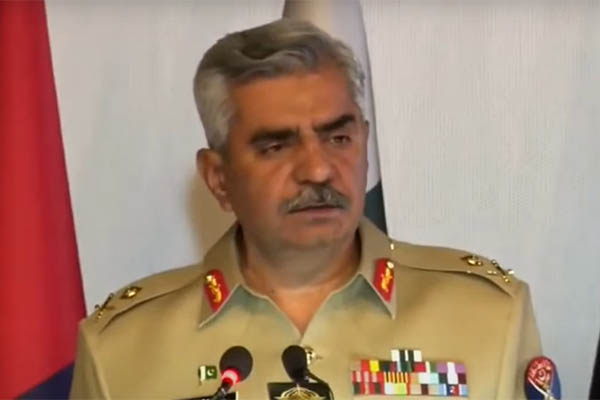
Screengrab of a press conference with Maj. Gen. Babar Iftikhar
The media arm of Pakistan’s armed forces on Sunday took strong exception to the ongoing proliferation of “unsubstantiated, defamatory, and provocative statements and remarks” against its senior leadership and urged all stakeholders to avoid such practices in the national interest.
“Recently there have been intensified and deliberate attempts to drag Pakistan armed forces and their leadership in ongoing political discourse in the country,” read a statement issued by the Inter-Services Public Relations (ISPR). “These attempts are manifest through direct, insinuated, or nuanced references to the armed forces as well as their senior leadership, made by some political leaders, [a] few journalists and analysts on public forums and various communication platforms, including social media,” it added.
While the statement did not single out any single individual or party, it is widely believed to be in reference to recent statements from the ousted Pakistan Tehreek-e-Insaf (PTI). Journalists sympathetic to the PTI’s narrative of a “foreign conspiracy” have repeatedly been calling on the Army to “intervene” in blatant demands for unconstitutional measures. They have been bolstered by PTI leaders, including former human rights minister Shireen Mazari and ousted prime minister Imran Khan, who has repeatedly rubbished the Army’s claims of “political neutrality” and claimed that it not “too late” to reverse “their mistake.”
Following Khan’s admission in a recent interview that he had wanted to retain Maj. Gen. Faiz Hameed as the head of the Inter-Services Intelligence spy agency because of the situation in Afghanistan as well as the Pakistan Muslim League (Nawaz)’s plans to oust him through a vote of no-confidence, PMLN Vice President Maryam Nawaz has also renewed her criticism of the incumbent Peshawar Corps commander’s facilitation of the PTI regime.
The ISPR statement stressed that the practice of criticizing the armed forces was very damaging to the national interest. “This practice of unsubstantiated, defamatory and provocative statements/remarks is extremely damaging,” it said, adding that the armed forces had taken “strong exception to such unlawful and unethical practice and expect[ed] all to abide by the law and keep the armed forces out of political discourse in the best interest of the country.”
This is not the first time the Pakistan Army has called on political leaders and the general public to resist dragging into politics. Last month, in a wide-ranging press conference, ISPR Director-General Maj. Gen. Babar Iftikhar had stressed that the Army had nothing to do with the vote of no-confidence and was an “apolitical” institution that would work with whichever party was in power.
